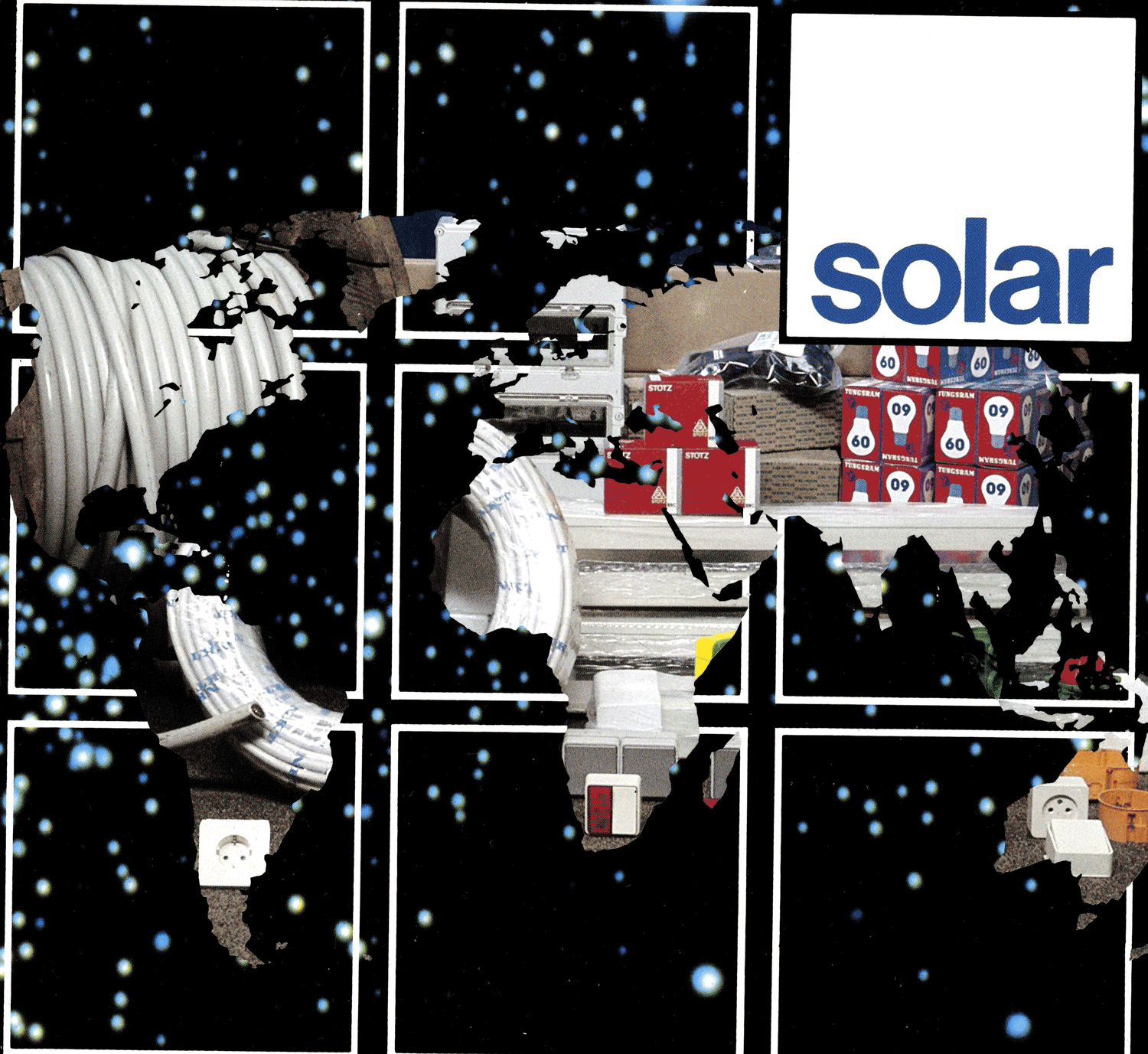Products, knowledge and solutions for trade and industry
Solar, Denmark’s biggest electrical wholesaler, listens to the tuning fork of the time and with investments and competence boost, they set the pace of a new agenda in the Danish electrical industry.
As C.P. Ørssleff dies in 1980, Solar loses its long-lasting procurement and sales generator. The temporarily appointed management becomes aware of the immense legacy which they have to carry on now in cooperation with the newly appointed trade directors.
Since 1976, Solar has focused on new business areas within industrial automation and energy control. As new product ranges of a more technical character enter the assortment, it is clear that it is no longer just a matter of delivering the right amount, at the right time to the right price. Now, you also need to be able to supply the right technical and promotional support.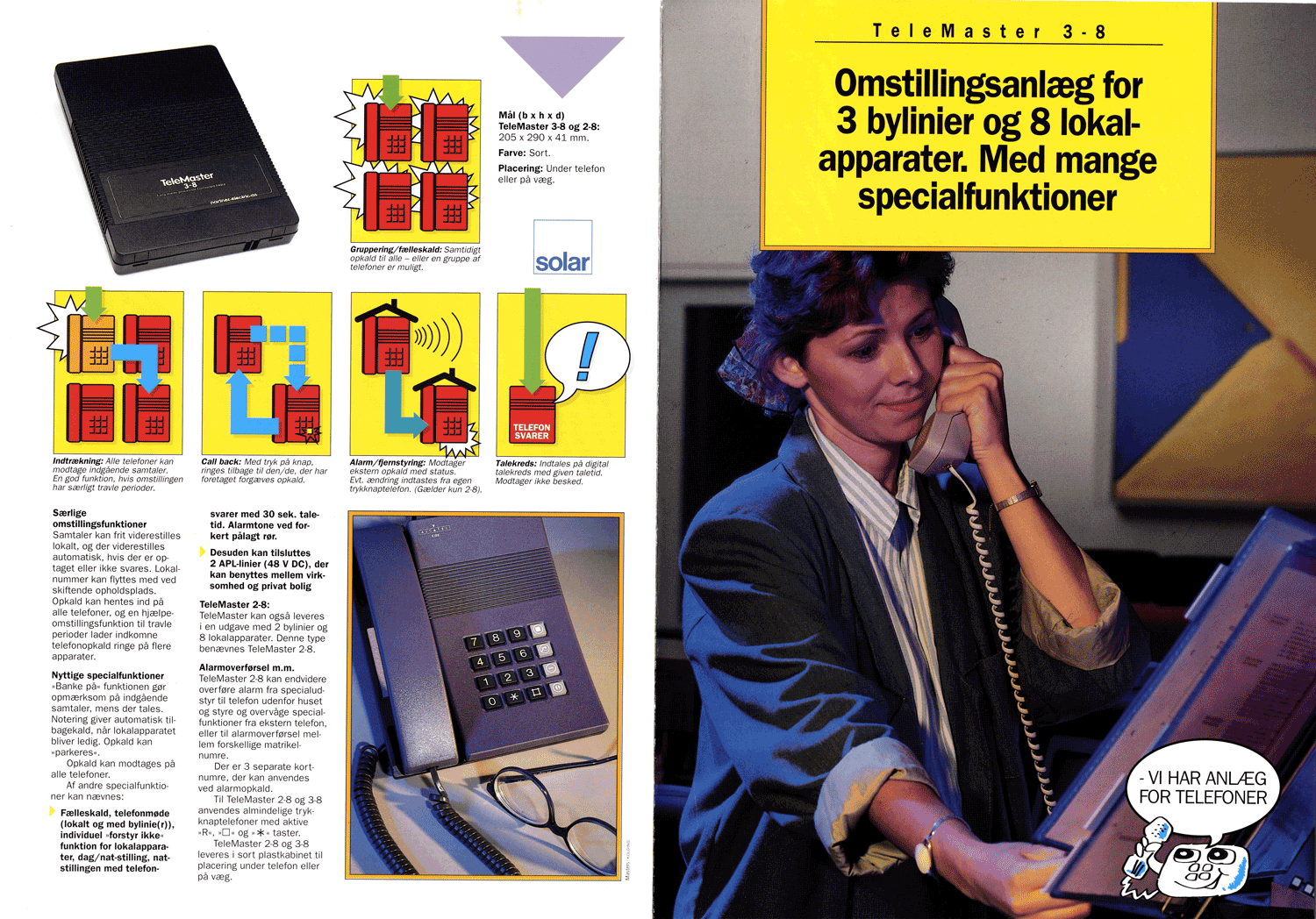
Tele communications ad. Solar offers central switchboards.
Sales director Carsten Ørssleff, who follows his father’s footsteps, soon makes it clear what is crucial, in order for Solar as a value-adding actor, to continue its journey in the yellow jersey and strengthen its market position, at the same time.
This young Sales director started out as an apprentice 20 years earlier. He was taught by Jacob Jørgensen and his father and he knows every inch of the company. From his time as branch manager in Frederikshavn and Nykøbing Falster he has been self-taught and has
With the support of both the management and the board of directors, this is the agenda of the coming years:
• Increased focus on sales, services, customer and sales politics
• Value-adding innovation and need driven business development based on new technology
• Strengthen procurement and sales with a central product and marketing management
• Education and a technical competence boost internally and externally
• Strengthen revenue through increased central supplier and warehouse management
The electronic age was still in its infancy in the 1970s. But in the wake of the increased use of digital aids, new products were constantly being developed from the beginning of the 80s. Such products opened up revolutionising new business opportunities within trade and industry.
At the beginning of the 80s, Solar and the Danish electrical industry are clearly entering an exciting decade. The pace will be incredibly high and only the strongest competitors will be able to keep up.
Education, Solar’s video production and product information
With the growth of the industry department and the introduction of new product groups, a massive need for information and education arises. Both staff and customers need training in the new technology and its application. Solar deducts that video is the best media when it comes to educating both small and large groups of people out in the branch offices. Therefore, in 1980, they decide to organise a recording studio including production facilities.
The videos contain both product information as well as application examples. At the same time, they come with printed materials called “Solar product Information”. Solar Video delivers a large number of films for Solar’s campaigns and customer events. With their videos for the Danish association of electricians’, (ELFO’s) theme meetings, they quickly become known in the industry. In 1984, Solar establishes a central department for internal training.
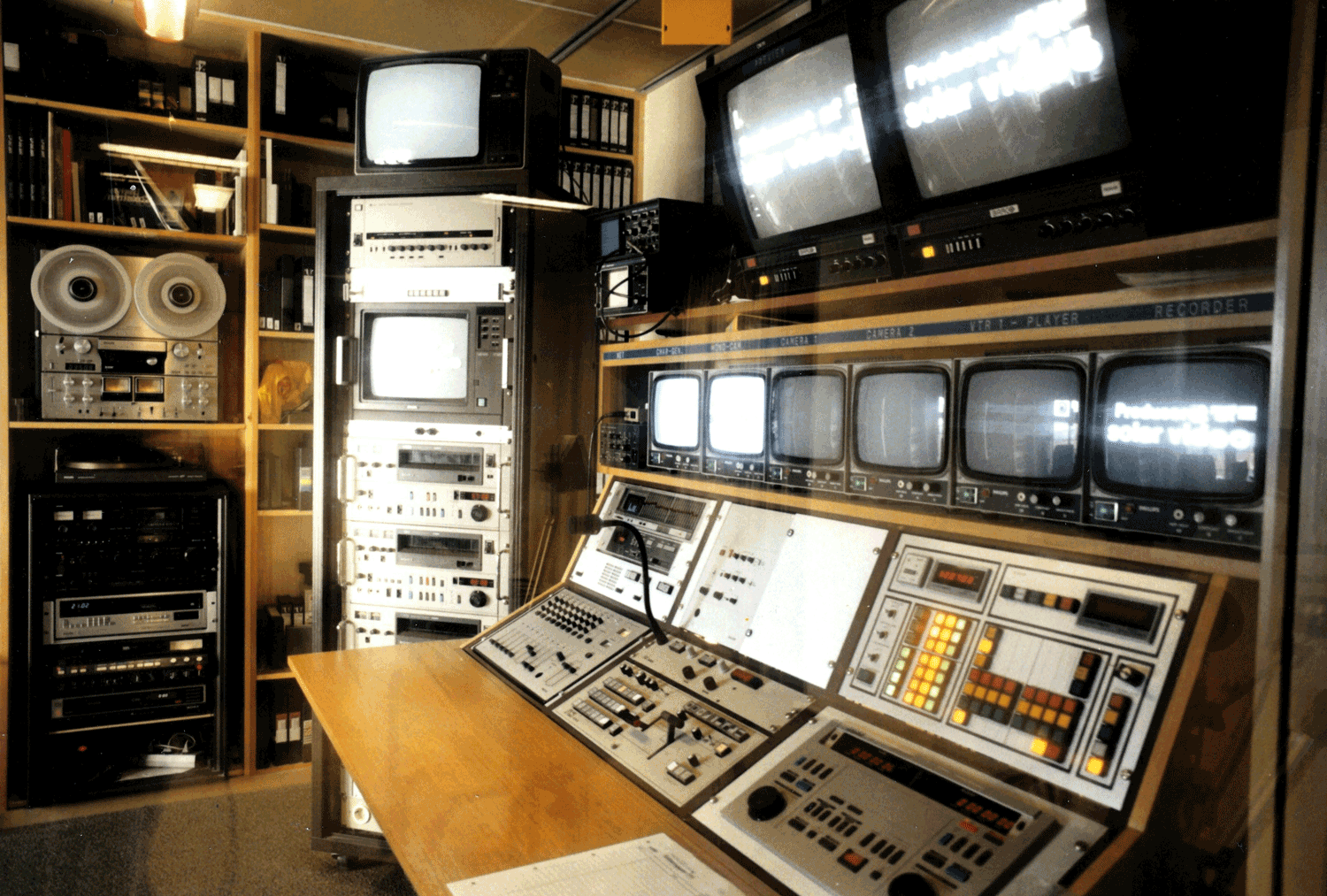 Solar's studio for video production.
Solar's studio for video production.
Development
Business development with new departments of specialist competences:
Starting out with Solar Offshore & Marine, Solar establishes multiple departments through the 80s:
1981 - Solar Offshore. Serves the oil and gas industry in the North Sea including Danish shipping companies and shipyards.
1982 - Solar Switchboards. Production of distribution boards and control panels for trade and industry.
1982 - Solar power stations department. The team serves utility companies and power stations.
1984 - The re-exportation department Solar International. Serves Danish construction companies abroad.
1985 - The department of technical processes, Solar PLC/PC. Sells PLC and process management systems to the industry. The wholesaler business expands in 1983 with a branch office in Slagelse, Denmark and the company P/F, Færøerne (Faroe Islands). 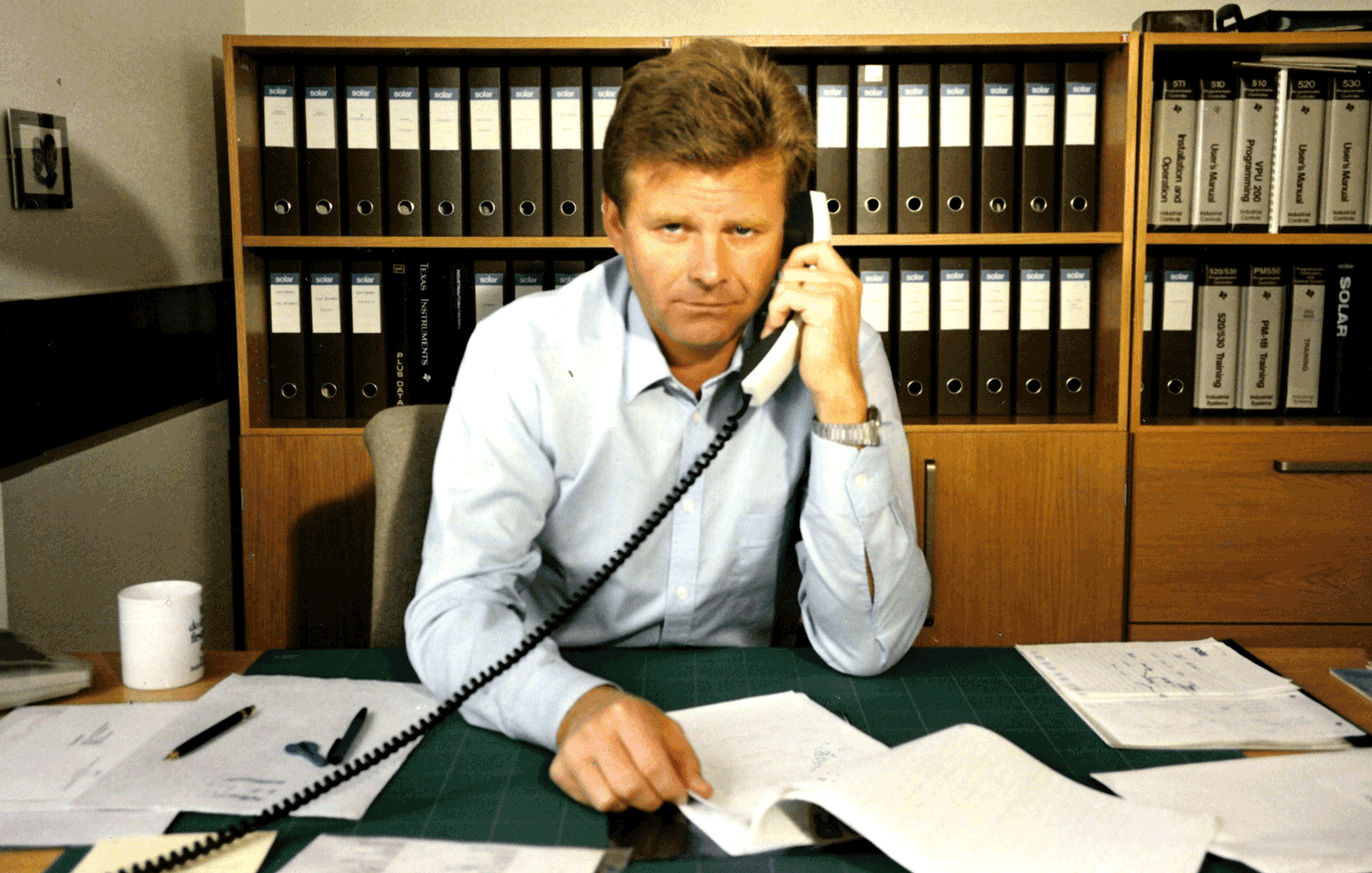
Villy Kronborg from Solar PLC and PC
Concepts
Concepts, theme events and campaigns
Starting out with the energy savings campaign and a national range of 96 industrial meetings counting 4,000 participants, Solar and expands. Through the 80s, they launch a range of campaigns with a business development concept. With the slogan “Solar- opens new ways”, the company becomes known to provide the Danish electricity industry with value-adding, new business opportunities.
1982 - EnergySavings. A campaign targeting electricians and consumers.
1984 - IndustrialAutomation. Focused on key areas of automation tasks within the industry.
1986 - Aerial campaign. Knowledge and solutions for single, common and satellite dish facilities.
1987 - Blue Zone. Surveillance and security, burglar alarms, access control and video surveillance.
1988 - The Fourth Installation. Seminars about data networks, IBM cable systems and fibre optics systems.
1989 - The Tele campaign. Knowledge and solutions, telephones and PABC/central switchboards. 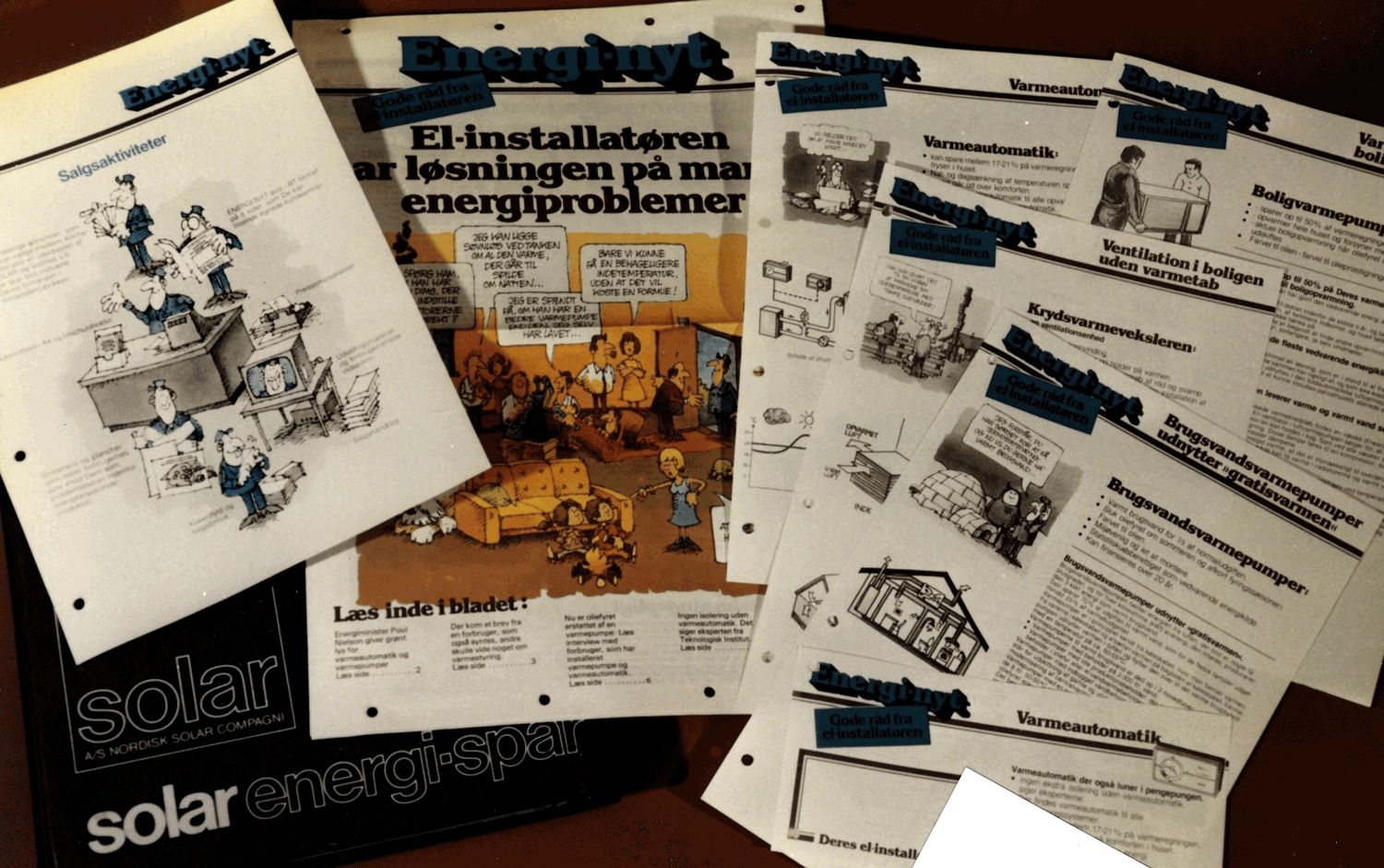
EnergySavings promotional materials
Acquisitions
Business development through acquisitions
Starting out with the company Rudolph Schmidt A/S in Herlev, Denmark, Solar acquires several companies in the 80s, which are sole distributors that import and promote technical products for OEM production companies.
1984 - Rudolph Schmidt A/S. Wholesaler; components and accessories for the radio and electronics industry.
1984 - Hermann Møller A/S. Is merged with Rudolph Smidth and has offices in Ålborg, Aarhus and Odense
1985 - Carl Brincker ApS. Importer and wholesaler based on foreign agencies.
1986 - Klitsø A/S. Important representation company within electricity and electronics components for Danish industry.
1988 - Regal Maskinelektro ApS. Specialist within management and regulations technology.
The acquisition of these companies increases the total sales within Solar and strengthens the market position of the company. It also leads to an increased revenue through supplier reorganisation, central procurement and warehouse management. Already a year after the acquisition of Rudolph Schmidt, in 1985, Solar’s central product management and procurement management teams have achieved direct import and sole distribution of a variety of industrial products.
Central warehouse and lighting factory in Vejen
Solar continues to replace the price-raising buys from importers and representatives with central and bundled procurement directly from the foreign manufacturers. Therefore, in 1984, the company decides to initiate a building project of 10,000 square metres in Vejen. Half of the space is used for Solar Production and their necessary expansion of capacity now that Solar Lighting and Solar Production are merged. This means that all lighting activities of the group is located in Vejen. The other half of the space is used for the initial establishment of a central warehouse for electricity materials and lighting. January 2nd 1986, the central warehouse starts to carry out orders for the branch offices. At the same time, it is decided to reduce the number of branch offices and slow selling products are moved to the central warehouse. This becomes the first steps towards Solar’s centralisations process of procurement, warehouse and distribution.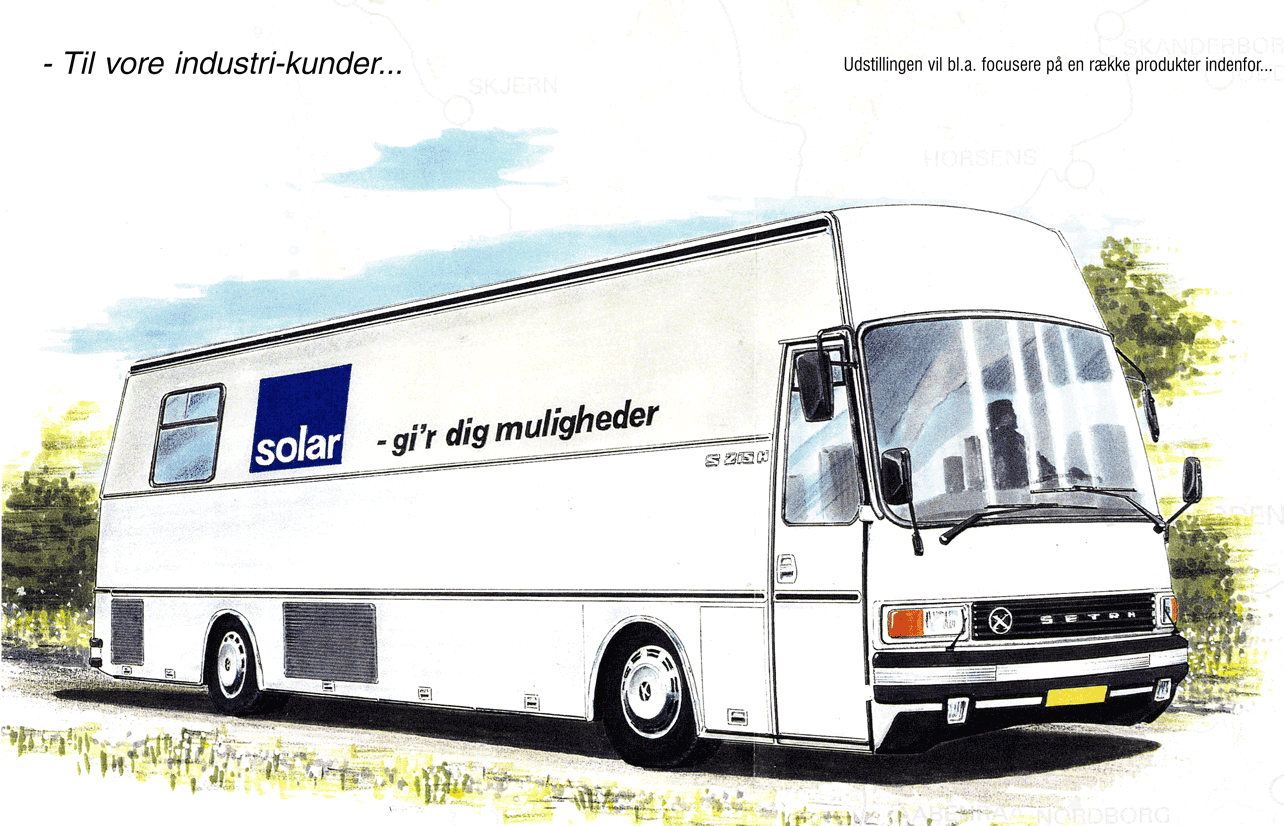
"Solar opens new ways". The new company slogan.
Generational shift of the executive board and management
The executives Harald Jørgensen and Jørgen Borum leaves the executive board on May 1st 1987, in order to make room for younger forces. Instead, they take a seat in the board of directors and look after the company’s interests.
Sales Director Carsten H. Ørssleff and Knud Erik Hansen, who up until now was the state certified accountant of the company elected at the annual general meeting, are appointed members of the executive board together with former deputy director Thorkild Thage-Jørgensen.
Then follows the appointments of authorised signatory Søren Larsen as Sales Director and authorised signatory Knud Erik Leth Nielsen as Procurement Director.
Electronic ordering with Solar Online
In 1984, Solar forms a new strategy and action plan for the coming five years. Here, sales management worked with the future scenario that orders would increasingly come from electronic devices. Either from portable terminals/scanners or from the electrician’s own edp-system.
Based on this foresight, Solar leaps yet again in front of the competition, as they in 1988 are the first ones to introduce e-commerce via modems with the Solar Online system.
From the first billion kroner to the first billion euros
In 1984, Solar achieves a billion kroner revenue, for the first time in the company’s history.
Stay tuned for the next chapter, which will be published on September 17th, and read about how Solar expands the business into the northern European market and thus set off towards a revenue that quickly exceeds 1 billion euros.
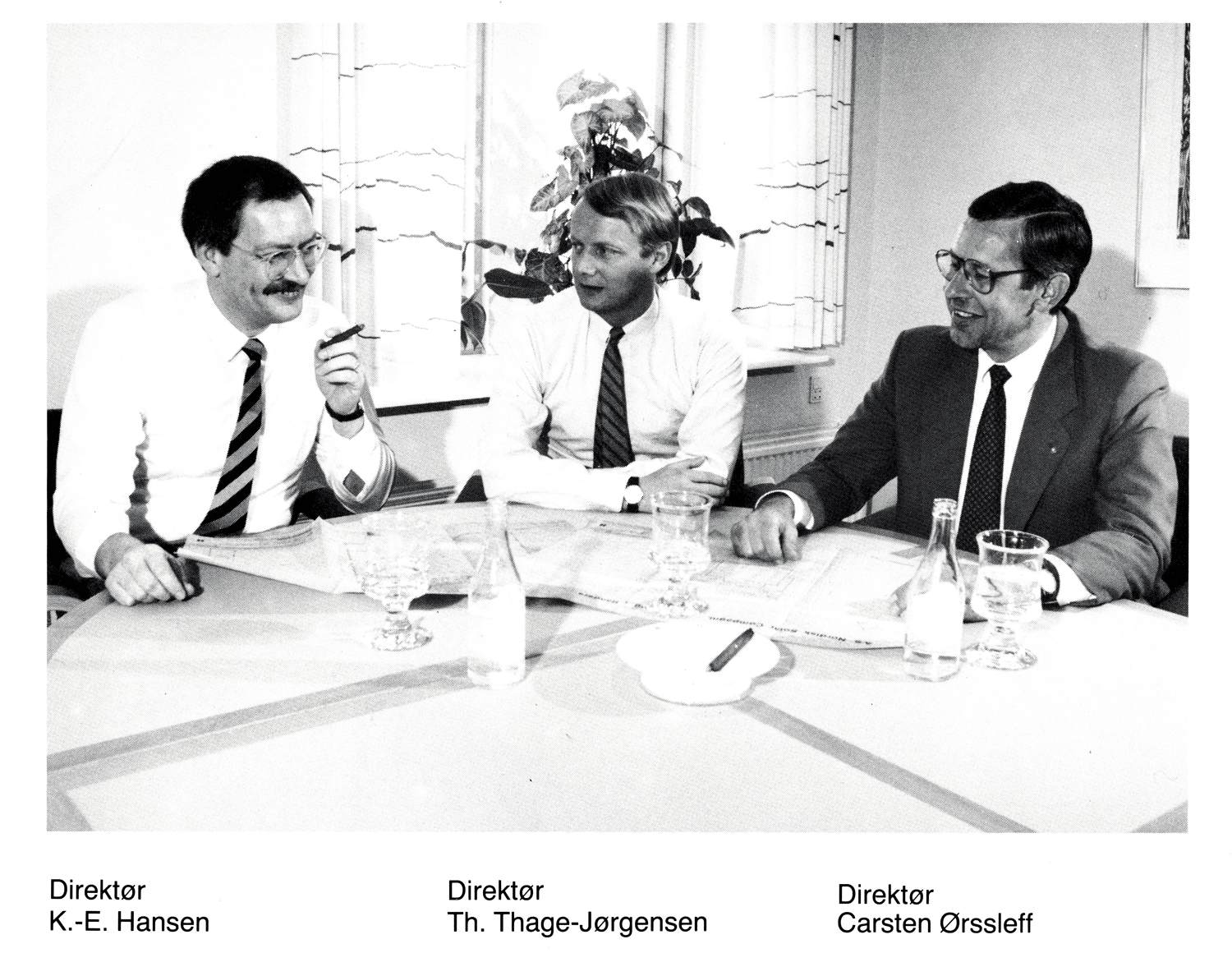
The 80s vibe
Long live the colourful patterns of the 80s shirts. Feel the vibes of the decade where digital aids emerged everywhere. Here, we get a sneak peek at the video production as well as the many campaigns that signified the communication of the company.
